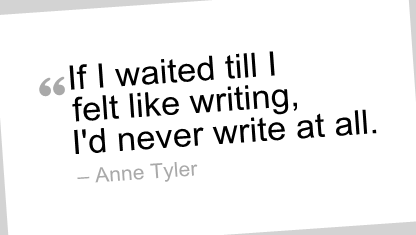Don't
bend; don't water it down; don't try to make it logical; don't edit your
own soul according to the fashion. Rather, follow your most intense obsessions
mercilessly.
~
Franz Kafka
Kafka,
you haunt me.
Whenever
I read these words, I am divided. One half of my heart swells in awe of your
insolent wisdom, at your unabashed defense of the artist's impertinence. You
forbid us to whitewash, to pretty-up the ugly corners of life. Do not tread
lightly on reality, you insist, but delve deep, and without apology. Show life
with all of its thorns, no matter who objects. Where inspiration leads, the
writer should follow with frenzied passion.
The other half of me spits at you.
I don't believe my heart was made for fiction. It goes against everything that has made me a writer -- a love for daily life, a quiet belief that every "normal" person, including myself, has a story. The little struggles we encounter each day say much more about our humanity, I think, than some grand, fictional misadventure. The truth is, I long for nonfiction. I long for its contemplative nature, its ability to find meaning in the mundane. Most of all, I long for its potential to highlight reality, and say, "There's no need for fiction. Life is dramatic enough on its own."
But
I need fiction, Kafka. I need it terribly.
With nonfiction, there comes a risk. There are many things in our lives that contain all the elements of a good story -- a mother's coldness, an uncle's cancer, a best friend battling alcoholism. If we stop to look around, we realize that the people we interact with everyday have tales begging to be told. But this fascination with the trials of others is dangerous. It requires us to investigate and speculate about people's private lives. The nonfiction writer must intrude -- often without permission -- upon someone's darkest, most intimate secrets.
What is wrong with us, Kafka? Why is it the darkness in people's lives, that which makes them most vulnerable, that inspires us most? We are sadists and parasites. Our work thrives upon the draining of others for our own gain. We delight in their shame, their injury, their deformities, exposing them for general entertainment and "the sake of art." We cannot see someone's wound, and leave it be. In our sick fascination, we pick at the scar, peek beneath its stitches, until it bleeds. Because as a writer, as an artist, we must know what’s inside.
You did well to choose the word "mercilessly," my dear Kafka. To write directly from reality, we have to adopt a kind of indifference. We can't care too much about our subjects; otherwise, we'd always feel guilty, and never write anything for fear of violating their privacy and soiling their reputation.
This is why I write fiction. It was never because my life was uninteresting. My family life has been rocked by death and mental illnesses. My friends have been torn by scandal and abuse. There are always things to write about. But my conscience is my weakness. I don't have the stomach for trespassing onto others' lives, for being an invader. For you see, the greatest danger of being a writer is not the lack of things to write about. It is the risk of someone getting hurt.
Did you ever love anyone, Kafka? Or did not loving give you the freedom to write?
ABOUT THE AUTHOR
Emma
Moser is a lifelong New England resident currently balancing her lives as a
college senior, local musician, and emerging writer. Her writing pursuits
include blogging, poetry, fiction, and creative non-fiction, and her work has
appeared or is forthcoming at several national venues, including Sigma Tau
Delta Rectangle, Zoomoozophone Review,
Thoreau’s Rooster, Sweatpants & Coffee,
and Fuck Fiction.
For
more articles, links to publications, and information about the author, please
visit her blog at: antiquedwriter.blogspot.com
Find me on Twitter
Find me on Twitter
[Image courtesy: author, google, and haaretz.com]















